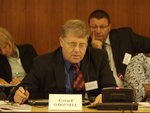Everard O’DONNELL
contribution 08 -
O’DONNELL Everard

tags
Politics & Justiceoriginal version
Thank you, Mr. Chairman. I just wish briefly to, in fact, endorse much of what has been unexpectedly said, since my request to speak, by Professor Schabas.
The whole issue of politics and justice is central to the purpose of the ICTR, because we were set up by a political organisation for political motives, but we are not directly concerned with those political motives or the ultimate political purpose, because the political organisation, the Security Council, that set up the ICTR intended that if justice were fairly done, then that would achieve its political purpose. And all we have to do is to keep politics out of our courtrooms in terms of decision‑making, although, of course, we are dealing with the stuff of politics. As we hear the evidence, it’s all concerned with politics. And we have sitting in the detention facility one whole government. There aren’t many times in the history of the planet when you can say that one whole government was taken and put together in jail cells together. And they continue to function as a government even within the prison. It’s interesting that they issue government communiqués. They hold cabinet meetings even within the prison.
We are concerned entirely with issues of politics, but we keep those political matters out of the consideration of the Judges. I know that because I have tried to subvert this process myself when I became an administrator. I tried to introduce political considerations to some Judges to try and solve an impasse, which had occurred in one of our cases, where somebody wished to make a political speech from the Defence. And I tried to get the Judges to break the impasse that was preventing the trial continuing. And I got thrown out of the Judges’ deliberation room, almost things thrown after me as I left. How dare I try to introduce such issues into their considerations.
So I can tell you within the sanctity of the judicial proceedings politics does not enter into the Judges’ considerations. They come from Peshawar, the supreme court there, they come and they sit down straight away in the ICTR, and they still think they’re in the supreme court of Peshawar, and they are very surprised to hear all these politics going on, but they carry on with their job as professionals. That’s what they do. They come from the Caribbean, they come from everywhere, but they function as they did before, as professional Judges. And that’s the wonder of the ICTR.
May I just say that of course political considerations are relevant to the decisions to prosecute. And I respectfully endorse what Professor Schabas said. We have the ICC example of what happens when a Prosecutor is oblivious to or does not think it is his job to take into consideration issues of international politics. He regards it as an issue of what I think is, to some extent, the shibboleth of prosecutorial independence, which in my opinion should be applied to everything after the decision to prosecute and not the decision in the first place.
The Security Council should control such issues. And in relation to the Great Lakes region, if ‑‑ and this, of course, is bordering, I know, on a shocking obscenity, but let me raise it with you. If in the Great Lakes region you were in the Security Council or a political decision‑maker in one of the significant actors in the international system and you decided that, as a matter of policy, it would be dangerous for peace and stability in the Great Lakes region to prosecute certain persons in that region, would you not be making a perfectly valid and sound political decision, even though we, who are down in the justice arena, might think that it was unfair not to have prosecuted some of those actors, those political actors. And ultimately I come from a system where democratic politics governs the judicial system. Politics must govern. And it’s the same in the Great Lakes region.
Vincent CHETAIL
Thank you very much for those clarifications. And when we talk about politics and justice, it does not exclude interference in the conduct of the trial. We are referring to more a wider context, and we have to look and ensure that the independence of the Judges is established. And we are looking specifically at the more comprehensive context.
Before giving the floor to the other speakers, I would like to apologize beforehand if I mispronounce any names. And I have an additional excuse because very few people can pronounce my name. And my colleagues in Benin have solved that problem by calling me Mr. Vincent. You can call me Vincent, and that is quite an excuse for me to mispronounce anybody’s name, starting by the name of my colleague Filip Reyntjens, who has the floor.

